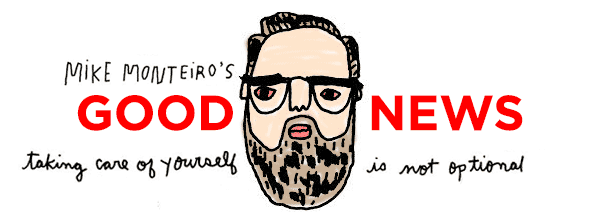Source originale du contenu

“We were looking for something a little more positive.”
So I got off Twitter about six months ago. There were a few reasons why—mental health, the constant outrage, the realization that I didn’t need to have a public opinion about every single thing in the world, Nazis. But mostly, I bowed out for a bit so I could focus on writing a book.
And now I’ve written that book. I believe it’s a good book, and certainly it’s the design book that needed to be written about design in 2019. I’m trying to get it on your hands but there’ve been a few hiccups. My first publisher backed out. It’s their house, they get to do that. I talked to another publisher who said they could release it in the Fall of 2020. I can’t wait that long. I had a literary agent tell me “who would pay money to read this.” And another publisher tell me “we were looking for something a little more positive.”
All of which led me down the road to a familiar place. Depression. Hello darkness, my old stupid friend. And I hung out there a while, because the music is good, and the company is familiar. But then I remembered. I remembered how all that music I like got made. Those bands didn’t sit around waiting for big fat contracts. They didn’t cry because they didn’t get to play the big venues. They didn’t cry because they didn’t have luxury tour buses. They packed all their shit in Ford Econolines. They lugged their amps into musty basements. They played their asses off to rooms with ten people in them. They made it work.
The name of the book is Ruined By Design: How Designers Destroyed the World, and What We Can Do To Fix It. I’ll print it on newsprint if I have to. But if there are ten people out there who want to read it, they’ll get to.
Here’s the excerpt you’ve been waiting for:
Moving Fast and Breaking Things
(an excerpt from Ruined by Design)
In February of 2017, after I’d badgering him for months, Jack Dorsey agreed to meet me in person. Oddly, he agreed to meet me at Square, his other company. (My dad had a bumper sticker on the family Volaré that said “My other car is a Cadillac” so I totally get it.) We had a civil discussion. He was a gracious host and I was a gracious guest. I asked him how he justified keeping Donald Trump on Twitter. I asked him how he justified not banning known white supremacists like David Duke and Mike Cernovich. In both cases, he gave me the free speech spiel he has memorized. He also told me there was a plan to deal with it, but they had to get it right. There was going to be a magical algorithm that took care of everything. He didn’t say magical. That’s my take. Jack was looking for a magical formula to fix everything. All at once. Without having to get his hands dirty. The fascists would get kicked out as soon as Twitter launched the algorithm that magically fixed anything. His approach was as passive as that sentence. Jack’s main priority was making sure he couldn’t be accused of having made a decision. His obsession with remaining impartial has made him impotent to act, even on the side of decency. He wants to be able cast blame on an algorithm, rather than his own actions. That way he wouldn’t have any blood on his hands.
Except the blood is already there. It's all over the people who’ve been silenced. How is it free speech when it silences so many? I am all for protecting free speech. Let’s start by amplifying the voices of those who’ve been silenced, not protecting the voices of those who’ve silenced them. A system that protects bullies isn’t a system we should be putting our labor into.
An algorithm is not a spine.
The boy kings of Silicon Valley love a good algorithm—they’ve designed some great ones over the years. But there are problems even the best math can’t solve. There are times when you physically have to walk over to a server and pull the plug. I get why they want an algorithm to do it—lack of accountability. Intentionally pulling the plug on someone who’s trolling women on your service is a decision. It requires agency, leadership, and a point of view. But should that troll get caught in an algorithm? Well, that’s a different matter. There was no intent to specifically get rid of that person. A good algorithm is the equivalent of breaking up with someone over a text message and then turning your phone off. It’s cowardly. Good leaders should aspire to have their fingerprints all over hard decisions.
By the way, I offered to walk over and turn off Trump’s account myself. Jack didn’t take me up on it.
Load up the Econoline. It’s gonna be a good ride.
Do me a favor and forward this to anyone you think might enjoy it.